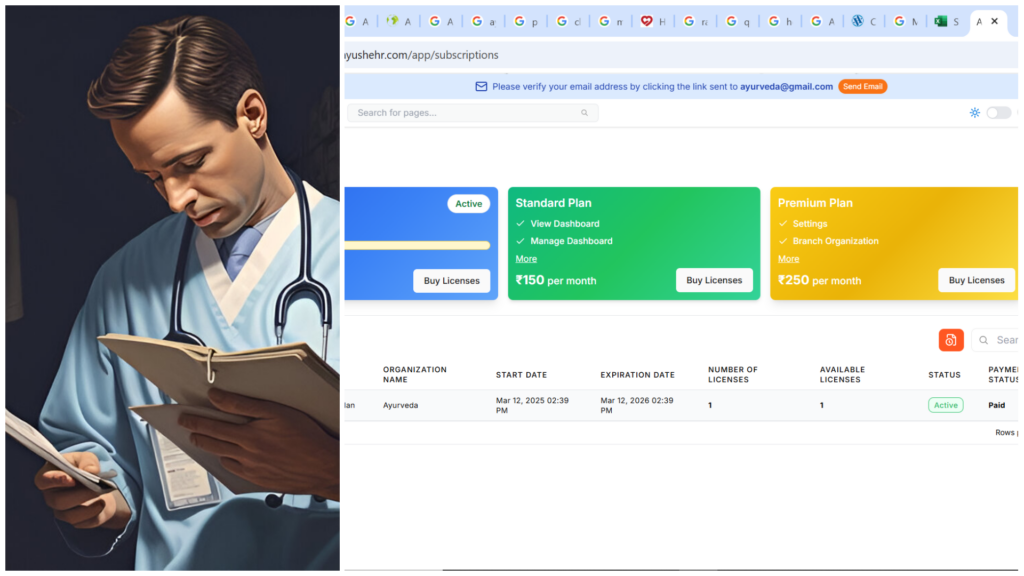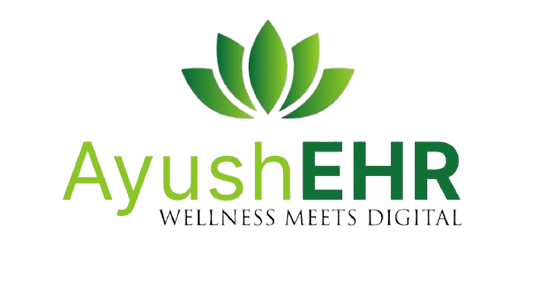The Role of EHR in Modernizing AYUSH Practices

Introduction
The integration of technology into healthcare has transformed patient care, efficiency, and data management across various medical disciplines. However, traditional systems like Ayurveda, Yoga, Unani, Siddha, and Homeopathy (AYUSH) have largely relied on conventional methods of record-keeping.
With the rise of Electronic Health Records (EHR), AYUSH practices are now poised for a digital revolution that enhances treatment effectiveness, operational efficiency, and patient engagement. This blog explores how EHR is modernizing AYUSH practices and paving the way for a more integrated and data-driven future in holistic healthcare.

Understanding the Need for Digitalization in AYUSH
AYUSH therapies are deeply rooted in personalized treatment plans based on a patient’s medical history, lifestyle, and environmental factors. Traditional record-keeping methods have made it challenging to track patient progress, maintain consistency, and analyze treatment effectiveness.
Key Challenges in Traditional AYUSH Record-Keeping:
- Manual record-keeping leading to inefficiency and data loss
- Lack of interoperability between different healthcare systems
- Difficulty in tracking patient history for long-term treatment
- Limited research opportunities due to unstructured data
- Compliance issues with regulatory requirements for digital health data
EHR systems address these challenges by providing structured, secure, and accessible digital records that benefit both practitioners and patients.
How EHR is Transforming AYUSH Practices
- Enhanced Patient Data Management
EHR enables AYUSH practitioners to maintain detailed and organized patient records, including symptoms, prescriptions, diagnostic tests, and treatment history. This structured approach improves diagnosis accuracy, treatment personalization, and long-term patient care.

- Interoperability with Modern Healthcare Systems
With global healthcare moving towards integrated models, AYUSH needs to align with contemporary medical practices. EHR facilitates seamless interoperability between AYUSH practitioners and allopathic doctors, enabling collaborative healthcare approaches and comprehensive patient treatment plans.
- Improved Research & Evidence-Based Practice
One of the biggest challenges in AYUSH is the lack of validated clinical data. EHR systems provide structured data storage that allows researchers to analyze treatment outcomes, track patient responses, and generate empirical evidence for alternative medicine’s effectiveness. This helps in gaining wider acceptance and credibility in mainstream healthcare.
- Regulatory Compliance & Standardization
Government policies, such as India’s National Digital Health Blueprint (NDHB), emphasize digital healthcare adoption, including AYUSH. EHR ensures compliance with data security standards like OpenEHR and FHIR, protecting patient privacy while meeting regulatory mandates.
- Efficiency in Clinic & Hospital Management

- Personalized Treatment Plans
EHR supports customized treatment recommendations by analyzing patient history, genetic predisposition, and lifestyle factors. This aligns with the personalized approach of AYUSH therapies, improving treatment outcomes and patient satisfaction.
- Telemedicine & Remote Consultation
With digital health gaining momentum, AYUSH practitioners can leverage EHR-integrated telemedicine solutions for remote patient consultations. This is particularly beneficial for patients in rural areas who may not have easy access to AYUSH specialists.
Challenges in Implementing EHR in AYUSH
While EHR presents numerous benefits, its adoption in AYUSH still faces some hurdles:
- Resistance to technology adoption among traditional practitioners
- High initial setup costs for EHR implementation
- Need for training & digital literacy among AYUSH professionals
- Integration challenges with existing healthcare IT infrastructure
- Ensuring patient data security & confidentiality
Addressing these challenges requires strategic efforts, including government initiatives, financial incentives, and comprehensive training programs for AYUSH practitioners.
The Future of EHR in AYUSH
As digital healthcare continues to evolve, the future of EHR in AYUSH looks promising:
- Government-backed initiatives will drive widespread EHR adoption
- AI & Big Data integration will enhance predictive analytics in AYUSH treatments
- Blockchain technology will improve security and data integrity
- Wider acceptance of AYUSH in mainstream healthcare due to evidence-backed research
Conclusion
EHR is not just a technological upgrade for AYUSH; it is a transformative tool that modernizes traditional practices, enhances patient care, and strengthens credibility. As AYUSH practitioners embrace digitalization, the sector is set to achieve greater recognition, integration, and effectiveness in holistic healthcare.
Now is the time for AYUSH providers to adopt EHR solutions and contribute to a more connected and data-driven healthcare ecosystem.
